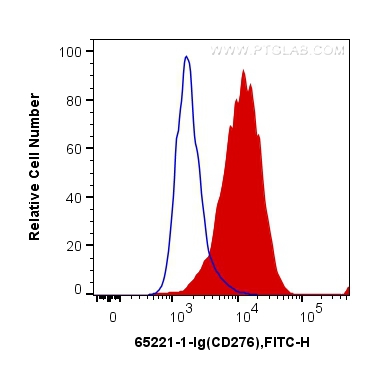验证数据展示
经过测试的应用
| Positive FC detected in | mouse peritoneal macrophages |
推荐稀释比
| Application | Dilution |
|---|---|
| This reagent has been tested for flow cytometric analysis. It is recommended that this reagent should be titrated in each testing system to obtain optimal results. | |
| Sample-dependent, Check data in validation data gallery. | |
产品信息
65221-1-Ig targets B7-H3/CD276 in FC applications and shows reactivity with mouse samples.
| Tested Applications | FC Application Description |
| Tested Reactivity | mouse |
| Immunogen | Mouse IgG2a Fc-CD276 (aa 1-242) fusion protein 种属同源性预测 |
| Host / Isotype | Rat / IgG1, kappa |
| Class | Monoclonal |
| Type | Antibody |
| Full Name | CD276 antigen |
| Synonyms | CD276, CD276 antigen, B7RP 2, B7-H3, B7h3 |
| GenBank Accession Number | BC019436 |
| Gene Symbol | Cd276 |
| Gene ID (NCBI) | 102657 |
| RRID | AB_2935144 |
| Conjugate | Unconjugated |
| Form | Liquid |
| Purification Method | Protein G purification |
| UNIPROT ID | Q8VE98 |
| Storage Buffer | PBS with 0.09% sodium azide. |
| Storage Conditions | Store at 2-8°C. Stable for one year after shipment. |
背景介绍
CD276 (also known as B7-H3) is a type I transmembrane protein expressed on many tissues and cell types. CD276 is a 100-kDa glycoprotein that belongs to the B7 immunoregulatory family and participates in the regulation of T-cell-mediated immune response probably by functioning as both a T cell costimulator and coinhibitor (PMID: 25567370; 20696859). Overexpressed on a wide range of human solid cancers, CD276 has been implicated in cancer progression and metastasis and becomes an attractive target for cancer immunotherapy (PMID: 27208063).
实验方案
| Product Specific Protocols | |
|---|---|
| FC protocol for B7-H3/CD276 antibody 65221-1-Ig | Download protocol |
| Standard Protocols | |
|---|---|
| Click here to view our Standard Protocols |
